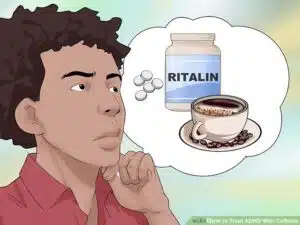
Most adults in America would consider themselves “avid coffee drinkers”, with the average American drinking about two cups per day. Personally, I have been known to refuse to have conversations before I have my morning coffee because “I am not fully awake yet”.
We use coffee, which contains caffeine, as a way to feel alert, concentrate and stay awake while studying or completing a project. Recently, although limited studies have explored this, caffeine has been used as a remedy to reduce symptoms of ADHD in adults and even in children.
How caffeine affects the brain
Caffeine acts as a stimulant on the Central Nervous System and works to improve brain functioning, memory and attention. Caffeine is also said to increase alertness and reduce drowsiness which can explain the “coffee craze”. Caffeine increases dopamine levels in the brain which is why it can be effective for people with ADHD (who typically produce lower levels of dopamine).
Caffeine and ADHD
Caffeine produces a similar effect as stimulant medications do on people with ADHD. While in the average person, caffeine can spike up his or her energy, in people with ADHD, it works to help them mellow out. Caffeine can help calm children with ADHD and improve their concentration. Adults with ADHD who drink coffee have said it helps them focus throughout the day.
One study exploring the effects of caffeine on ADHD, worked with rats in a laboratory that were “impulsive, hyperactive and had poor attention” (the main symptoms of ADHD). After being injected with caffeine, these rats had an improved memory and an increased ability to learn which lent early support towards the use of caffeine for ADHD treatment.
Be cautious of drinking caffeine with ADHD
One mom described, how on her own, she started mixing caffeine into her seven year old son’s hot chocolate every morning. Using this routine, her son actually appeared to be calmer and described feeling less jittery in the day. In this specific case, caffeine did the trick.
However, giving caffeine to a child is definitely something you should talk over with a doctor or child psychologist. First of all, giving caffeine to children is generally discouraged as they are more sensitive to its effects. Caffeine can also cause negative side effects such as anxiety, nervousness or sleep deprivation (which has been shown to worsen symptoms of ADHD).
Caffeine withdrawal can cause headaches, tiredness, irritability and lack of concentration. One should keep this in mind before putting a child on a schedule where they ingest caffeine regularly.
While caffeine studies sometimes reveal positive results, the results are limited and it cannot be confirmed how successful it is. Also, other treatment options for ADHD have been proven to reduce symptoms more drastically than caffeine can (such as medication).
Caffeine and Medication
Medication is a more reliable and proven method of treating ADHD, recommended by most clinicians while the use of caffeine for children remains frowned upon. If you or your child are already taking stimulant medications for ADHD, you should consult your doctor before combining this with caffeine because the combination of the two can produce powerful results.
Medication and caffeine can cause side effects such as nausea, dizziness, anxiety etc. and when taking both together, one risk experiences stronger side effects.
Advice for people with ADHD drinking Coffee
1)Drink it in the morning, not at night
2)Caffeine does not work for everyone, check if its helping by paying attention to how your symptoms are over time
3)For children, be especially cautious and talk to a doctor first!!!!
Work cited
https://www.healthcentral.com/article/can-a-cup-of-coffee-help-reduce-adhd-symptoms
https://sciencebasedmedicine.org/caffeine-for-adhd/
https://www.livestrong.com/article/331507-the-effects-of-caffeine-on-concentration/
https://psychcentral.com/lib/caffeines-effect-on-adhd-symptoms/
https://www.healthline.com/health/adhd/caffeine#stimulation2

